The digital density meter built-in embedded micro receipt printer for easy data printing. The high-quality tap density meter is suitable for metal powder, non-metal powder, pharmaceutical, chemical, new energy, new materials, scientific research and teaching and other fields.
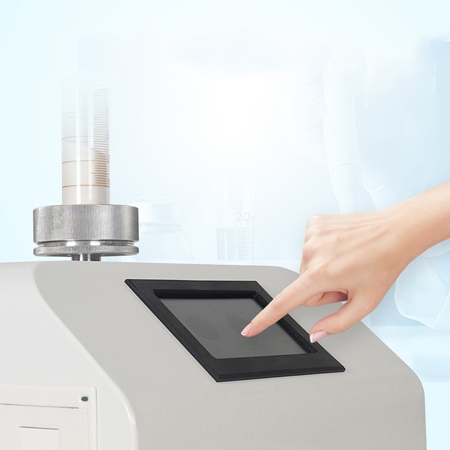
The tap density meter features a 4.3-inch touchscreen
- High-accuracy digital density meter provides a more convenient, simple and natural way of human-computer interaction.
- The density meter uses a lightweight, low-resource, high-performance, configurable and beautiful GUI (human-computer interaction interface) to improve the user experience level.
- Touchscreen functionality allows for faster and more accurate data entry compared to traditional button-operated interfaces, enhancing efficiency during calibration and measurements.
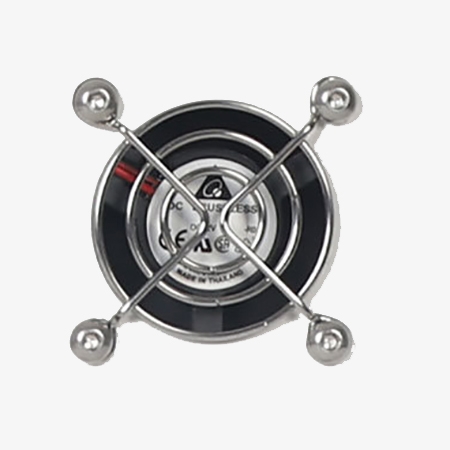
The density metre design with a rear cooling fan
- The rear cooling fan of the density meter helps regulate the internal temperature of the density meter, preventing overheating and ensuring stable performance during prolonged use.
- By effectively dissipating heat, the cooling fan helps protect sensitive electronic components from thermal damage, thereby extending the lifespan of the device.
- Maintaining an optimal internal temperature helps ensure that the densitometer provides consistent and accurate measurements, even during extended measurement sessions.
Applications
SISCO density meters are essential tools in various industries for measuring the density of liquids and solids. They are widely used in the chemical industry, food and beverage industry, oil and gas industry, pharmaceutical industry, etc. Density meters play a critical role in quality assurance and process optimization across multiple sectors.
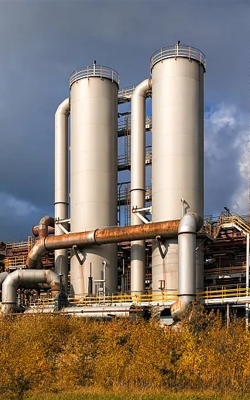
Oil and Gas Industry
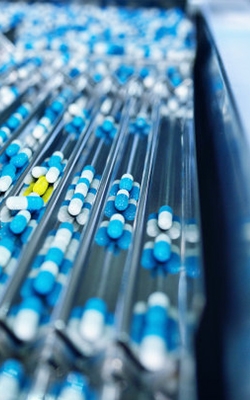
Pharmaceutical Industry

Food Industry

Chemical Industry
| Model | SISCO-DENSITY-TP301 | SISCO-DENSITY-TP302 | SISCO-DENSITY-TP303 |
| Supported Workstations | Single-Station | Double-Station | Triple-Station |
| Vibration Duration | 0 ~ 60 minutes adjustable | ||
| Volatilization Frequency | 300 rpm adjustable | ||
| Vibration Amplitude | 1-15mm adjustable | ||
| Vibration Amplitude | 3mm, 14mm (optional) | ||
| Number of Vibrations | 15-320TAP/min adjustable, can set the number of times to 99999, or vibrate continuously | ||
| Amplitude Error | ±0.1mm | ||
| Volatilization Method | ≤1% | ||
| Volatilization Method | Up and down vibration + rotation | ||
| Working Power Supply | AC 200V ± 10V, 50/60Hz | ||
| Cylinder Volume | 25ml/ 100ml | ||
| Continuous Working Time | 8 Hours | ||
| Built-in Printer Specifications |
Paper width: 58mm, Paper bin: ≤30 mm, Roll length: 9.42m, Print speed: 60mm/s |
||
| Weight | 25kg | ||
Detail
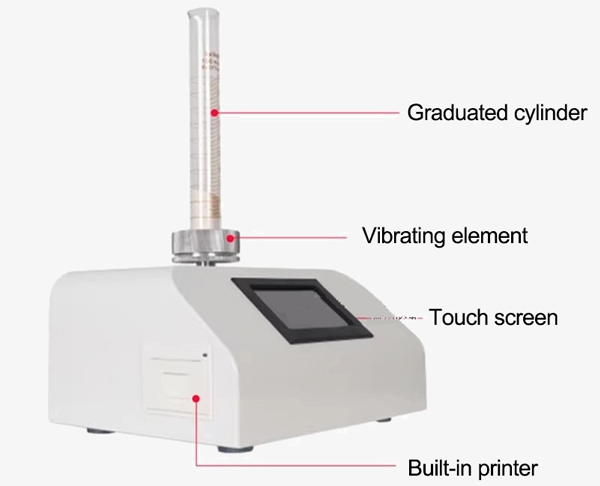
A1: What is a density meter used for?
Q1: Density meters are instruments that measure the density of a sample liquid or gas. Digital density meters are used in the pharmaceutical, petroleum, chemical, and food and beverage industries for quality control and in research and development.
A2: How does a fork density meter work?
Q2: The Fork Density Meters use vibrating fork technology to measure density directly, and can be used in process control where density is the primary control parameter for the end product or as an indicator of another quality control parameter, such as %solids or %concentration.
A3: How to use a density meter?
Q3: Density meters work by measuring the oscillation of a glass tube that contains the sample. There are digital density meters that can measure specific gravity and refraction index as well as the density of a sample.
Tips: Differences between single, double, and triple station tap density meters
- Single-Station Tap Density Meter: The single-station tap density meter features one measurement position, which can measure one sample at a time, suitable for low-volume testing. Ideal for low-volume testing and laboratories with less frequent measurement needs.
- Double-Station Tap Density Meter: The double-station densitometer features two independent measurement positions, and can measure two samples simultaneously, effectively doubling the throughput compared to a single-station meter. Suitable for medium-volume testing and environments where increased efficiency is required.
- Triple-Station Tap Density Meter: The triple-station densimeter features three independent measurement positions, and can measure three samples at once, providing the highest throughput and efficiency. Best for high-volume testing and laboratories with frequent and simultaneous measurement needs.
Thank you for buying industrial test and measurement equipment on SISCO.com, all products sold by SISCO and the partner cover a 12 months warranty, effective from the date of receiving the products.
What is covered?
SISCO is responsible for providing free spare parts, and free technical support to assist the customer to repair the defective products until the problem is solved.
What is not covered?
- Product purchased from anyone other than a SISCO store or a SISCO authorized reseller.
- Expendable parts.
- Routine cleaning or normal cosmetic and mechanical wear.
- Damage from misuse, abuse or neglect.
- Damage from use of parts other than SISCO approved.
- Damage from use outside the product’s usage or storage parameters.
- Damage from use of parts not sold by SISCO.
- Damage from modification or incorporation into other products.
- Damage from repair or replacement of warranted parts by a service provider other than a SISCO authorized service provider.
- Damage caused by the application environment not meeting the product usage requirements and the failure to perform preventive maintenance.

